|
|
|
Sort Order |
|
|
|
Items / Page
|
|
|
|
|
|
|
| Srl | Item |
| 1 |
ID:
155137


|
|
|
|
|
| Summary/Abstract |
Treating the threat of climate change in the Caribbean as a case study instructive for responses globally, this article examines the social and political relations of climate change. It argues for an analysis taking into account the ways in which the histories of imperialism and colonialism have shaped contemporary global ‘development’ pathways. The article charts how Caribbean vulnerability to temperature rises of more than 1.5°C of warming comprise an existential threat structured by contemporary social relations that are imperialist in character. Hope can be taken from a politics of climate justice which acknowledges the climate debts owed to the region.
|
|
|
|
|
|
|
|
|
|
|
|
|
|
|
|
| 2 |
ID:
155140
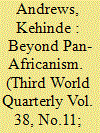

|
|
|
|
|
| Summary/Abstract |
Pan-Africanism is an identifiable movement with its own history and historical and ideological roots. It formally began at the first Pan-African Congress in London in 1900 and has a distinct linage up to the present day African Union. Unfortunately, the movement has not presented a challenge to imperial domination in Africa, rather it has helped continue the exploitation of the continent. Accepting the colonial nation state has prevented any politics of liberation from developing in the movement. It is central to decentre Pan-Africanism from radical histories of resistance because the movement developed in parallel to and rejection of more revolutionary, anti-imperial politics. Garveyism developed a mass movement rooted on the global Black nation, shattering the boundaries of Westphalian sovereignty. Malcolm X picked up the work of Garvey, developing on some of its regressive weakness to form the Organization of Afro-American Unity. By unpicking this tradition from Pan-Africanism we can begin to chart a route to revolutionary concepts and practice of nationalism that can present a challenge to the imperial social order.
|
|
|
|
|
|
|
|
|
|
|
|
|
|
|
|
| 3 |
ID:
155141
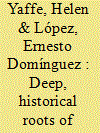

|
|
|
|
|
| Summary/Abstract |
Colonialism, imperialism and anti-imperialism have been decisive in shaping Cuban political identity for 150 years. US determination to control Cuba, consistent with the Monroe Doctrine, had a strong economic rationale even before Spain was defeated in the War of Independence in 1898. Debate raged between Cubans who aspired to true independence and an annexationalist minority, who favoured union with the US. The Platt Amendment imposed on Cuba by the US in 1903 ‘reduced the independence and sovereignty of the Cuban republic to a myth’. Between then and the Revolution of 1959 Cuba was effectively first a protectorate and then neo-colony of the US, which dominated the Cuban economy, politics and foreign policy. Tackling the terrible socioeconomic and political effects of Cuba’s subjugation under the Spanish empire and then US imperialism necessitated a radical transformation of the Cuban economy, political institutions and power structures. The transition to socialism inevitably meant confronting US imperialism – and vice versa. Since 1959, US imperialism, with its powerful allies in the right-wing exile community based in Miami, have relentlessly tried to destroy the Revolution and Cuban socialism. The issue of imperialism remains key today, in the post-Fidel, President Trump era.
|
|
|
|
|
|
|
|
|
|
|
|
|
|
|
|
| 4 |
ID:
155136
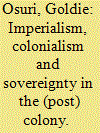

|
|
|
|
|
| Summary/Abstract |
Examining a classic formulation of the relationship between colonialism and postcolonial nationalisms in postcolonial theory, as well as its recent critiques, this article puts forward a thesis that contemporary colonialisms and imperialisms may be best diagnosed through the lens of identifying forms of sovereignty rather than relying on the geopolitical framework of West/non-West recognisable in the conceptual vocabulary of postcolonial theory. Focusing on the disputed issue of Indian sovereignty over Kashmir, this essay asks the following questions: What forms of occupation by postcolonial nation-states remain concealed by ways in which extant postcolonial approaches assume geopolitical divisions? Why is it necessary to rethink the parameters of imperialism and colonialism for a contemporary era?
|
|
|
|
|
|
|
|
|
|
|
|
|
|
|
|
| 5 |
ID:
155135


|
|
|
|
|
| Summary/Abstract |
This article examines the recent dynamics of European imperialism in Libya in the light of Marx’s theory of the global reserve army of labour. It analyses the limited advance of Western imperialism in Libya in the decade before the 2011 uprisings, the interactions between local, regional and international forces during and after the North Atlantic Treaty Organization (NATO) intervention, and, finally, the evolving migratory patterns from Libya. In this light, the instability along the southern and eastern Mediterranean coastline – a product of the uprisings and the forms of political reactions they unleashed – is simultaneously a security threat and a channel of migratory movements to European capitalism.
|
|
|
|
|
|
|
|
|
|
|
|
|
|
|
|
| 6 |
ID:
155138


|
|
|
|
|
| Summary/Abstract |
While neo-imperialism is becoming increasingly discussed within academia and by public intellectuals, this paper hypothesises that, due to resource needs of social movement organisations, neo-imperialism is not a major diagnostic frame used by international solidarity organisations in the Global North. We tested this hypothesis by examining diagnostic collective action frames used online by 30 organisations across three solidarity movement issues: climate justice, refugee solidarity and debt relief. While the frame was infrequently used across the organisations, results reveal that those organisations that did utilise the frame with some regularity had constituencies that have suffered from historical forms of imperialism. A qualitative analysis was used to locate the contexts in which the frame was used and the prominence these uses had within the organisations’ public broadcasting.
|
|
|
|
|
|
|
|
|
|
|
|
|
|
|
|
| 7 |
ID:
155134
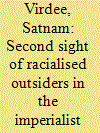

|
|
|
|
|
| Summary/Abstract |
This essay focuses attention on a current of socialist internationalism within imperial Britain and the formative role played by racialised outsiders of Irish Catholic, Jewish and Indian descent in actualising anti-racism and anti-imperialism. The collective memories of colonial subjugation combined with their outsider status within Britain itself endowed them with a second sight that enabled them to see through the usual fog of blood and belonging and act as a leavening agent connecting the struggles of workers of different ethnicities within Britain, as well as with those beyond. The essay concludes with a call to accommodate the emancipatory potential of the racialised outsider position in critical theory and practice. In particular, if contemporary Marxism is to remain relevant, it must be stretched to accommodate the specificity of racism and anti-racism without reducing it to class. The lessons for political practice appear equally compelling: emancipatory politics today need to accommodate how identifications of race are materially inscribed social realities which can facilitate resistance against racism. In that sense, socialist political practice will have to be more intersectional if a sustainable solidarity is to be forged between the ethnically diverse proletariat in the imperialist core, as well as with those beyond.
|
|
|
|
|
|
|
|
|
|
|
|
|
|
|
|
| 8 |
ID:
155142
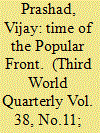

|
|
|
|
|
| Summary/Abstract |
Our political world is impoverished by the lack of the category ‘imperialism’. Academic and media languages have succeeded in consigning it to history. Use of the category imperialism to describe our present condition is often met with derision; it is seen in the bourgeois tongue as too simplistic, as outdated, as Leftist bombast. But what other category do we have to explain the kinds of extra-economic institutional coercion meted out to the Third World during the 1980s debt crisis or to Greece in its ongoing tragedy? Academic and media languages would like to measure these political conflicts in the terms of mainstream social science – as state failure and economic mismanagement, as the imbalance between the greed of unions and the sensibleness of the bankers. Empirical description takes the place of theoretical understanding – a mass of data and information clogs up the arteries, while careful theoretical assessment of the problem is set aside. The Left is on the defensive, unable to explain why the North Atlantic Treaty Organization (NATO) wants to bomb this country or why the International Monetary Fund wants to extract its pound of flesh from that country.
|
|
|
|
|
|
|
|
|
|
|
|
|
|
|
|
| 9 |
ID:
155139
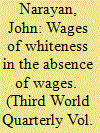

|
|
|
|
|
| Summary/Abstract |
In November 1970, Black Panther Party leader Huey P. Newton gave a lecture at Boston College where he introduced his theory of intercommunalism. Newton re-articulated Marxist theories of imperialism through the lens of the Black liberation struggle and argued that imperialism had entered a new phase called ‘reactionary intercommunalism’. Newton’s theory of intercommunalism offers nothing less than a proto-theorisation of what we have come to call neo-liberal globalisation and its effects on what W. E. B. Du Bois had seen as the racialisation of modern imperialism. Due to the initial historical dismissal of the Black Panther Party’s political legacy, Newton’s thought has largely been neglected for the past 40 years. This paper revisits Newton’s theory of intercommunalism, with the aim of achieving some form of epistemic justice for his thought, but also to highlight how Newton’s recasting of imperialism as reactionary intercommunalism provides critical insight into the rise of Trumpism in the US.
|
|
|
|
|
|
|
|
|
|
|
|
|
|
|
|
| 10 |
ID:
155133


|
|
|
|
|
| Summary/Abstract |
From the writings of Lenin, the guerrilla activity of Che Guevara, the anti-racism of the Black Panther Party and the Third World’s plan for a New International Economic Order, the idea of imperialism and the politics of anti-imperialism were a mainstay of political vernacular throughout most of the twentieth century. Yet, with the onset of neo-liberal globalisation in the Global North and, most importantly, in the Global South the idea of imperialism has seemingly disappeared or been deemed irrelevant. This special issue draws on a range of theoretical contributions that use the prism of imperialism to explore the strengths and limits of classical Marxist theories of imperialism; the relationship between Marxist, post-colonial and de-colonial approaches; imperialism and social movement theory; and the strengths of returning to ideas of Black Marxism and Pan-Africanism in the midst of contemporary neo-imperialism. These theoretical debates are in turn complemented by the collection exploring the idea of imperialism from different empirical vantage points in the Global North (Europe, US) and Global South (Africa, the Caribbean, Cuba and Kashmir). The issue thus provides both theoretically and empirically innovative interventions on how we should conceptualise and approach the idea of imperialism in the twenty-first century.
|
|
|
|
|
|
|
|
|
|
|
|
|
|
|
|
|
|
|
|
|